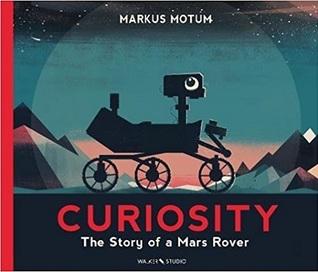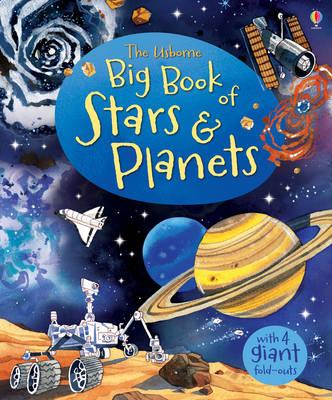
scrounge: /skrounj/ informal verb: to actively seek [books] from any available source

Curiosity: The Story of a Mars Rover is a great book for kids who are curious about outer space and astronomy, robots, or science and technology in general. While it conveys a lot of information and has more pages than many picture books, most pages aren't very wordy and so it might also appeal to some pre-kindergarten-aged children too.
The story is told from the perspective of Curiosity itself, and that plus the eye in the cover picture made me a bit wary, because it can be easy for the personification of non-human characters to distract from the story or veer into absurdity. But I think it works here. Curiosity's story is still told in a straightforward, nonfictional manner -- the personification wasn't done for entertainment value but instead to help keep the narrative relatable and focused.
This book is about Curiosity, but it's largely about science in general -- about questions and answers and why we send all these robots into space to begin with. I like how the grander desire for exploration is expressed so clearly throughout the story of the robot, making the scope much larger than just one robot or planet.
Of course, the robot's story is primary, from the whys and hows of development, to interesting details and complications involved in the launch, to the tension of the final moments of Curiosity's arrival on Mars that was witnessed by people around the globe. And all this still manages to stay within the realm of understanding of a young elementary-aged child.
I thought this book was really well done, and would make a great gift or science resource for elementary-aged children.
Scrounged From: Amazon
Format: Hardcover
Author/Illustrator: Markus Motum
Pages: 56
Content Advisory: None

This afternoon my five-year-old son asked what I was doing on the computer. I explained that I often write up book reviews to put on this blog. Then he asked if he could write one, so I told him to go find the book he most wanted to write about.
I'm not surprised that he picked The Usborne Big Book of Stars and Planets, because it's one of his favorites. For kids who are interested in outer space, this book contains a great deal of information (don't be fooled by the "16 pages" -- several of them fold out to twice their length). It also contains many lovely and realistic illustrations.
He dictated his review to me, with a little prompting in the beginning to try to get him to focus on what he likes best about the book. By the end he was just going through it and talking about what struck his fancy. I didn't write down every word, but I got the gist of what he was saying.
Me: Why do you like this book?
T: Well, it's about planets and I like planets.
Me: What did you learn about planets?
T: Well, I learned that a long time ago, when two things crashed together, they made something new, a very very long time ago. Before my parents were even born. [referring to the Cartwheel Galaxy]
Me: What else?
T: There were robots that drive on Mars. And I like what they do. They're cool machines.
Me: Do you remember the names of any of them?
T: Constrosity? [Curiosity]
Me: What else did you learn from the book that you thought was interesting?
T: Meteors are little tiny space rocks that burn up in the earth's atmosphere. I like that we have an atmosphere on the earth so we can breathe.
Jupiter is big. And there's a belt with asteroids called the asteroid belt, and it goes around the sun. And they shouldn't get too close to the sun because the sun is HOT HOT HOT. So don't ever go into space just to touch the sun. I wouldn't want to touch Venus either.
There are super giant stars that are even bigger than the sun. And they run out of life. And when they die, they blast into a big explosion, just like a volcano has an explosion. And the stars come from the nebulas. And probably there wouldn't be stars if there wasn't nebulas. And probably I wouldn't like space if there wasn't stars and nebulas. Stars make the page best, so it's good for looking at.
Giant galaxies are in the book too.
So, there was a thing that maybe even went out of our solar system. [Voyager 1] But, it took a few pictures, but there's still another thing that takes pictures, it's the space telescope -- it takes pictures and sends them back to earth with the antenna. I'm not sure how it does that, but somehow it does that.
And parachutes carry astronauts back to earth.
The robots are on Mars. They pick up rocks and discover them to see if they were ever covered with water or ice on Mars. And when you're looking at the sky you can see all kinds of shapes. And you can see the dog star. And at last, the lion, the big dipper, and a lot of other things. You'll find this book pretty interesting if you look at it ever in your life.
Scrounged From: Usborne
Format: Hardcover
Author: Emily Bone
Illustrator: Fabiano Fiorin
Pages: 16
Content Advisory: None

